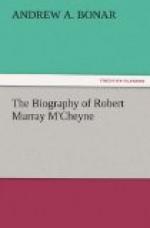Mr. M’Cheyne knew the snare of popularity, and naturally was one that would have been fascinated by it; but the Lord kept him.
He was sometimes extraordinarily helped in his preaching; but at other times, though not perceived by his hearers, his soul felt as if left to its own resources. The cry of Rowland Hill was constantly on his lips, “Master, help!” and often is it written at the close of his sermon. Much affliction, also, was a thorn in the flesh to him. He described himself as often “strong as a giant when in the church, but like a willow-wand when all was over.” But certainly, above all, his abiding sense of the divine favor was his safeguard. He began his ministry in Dundee with this sunshine on his way. “As yet I have been kept not only in the light of his reconciled countenance, but very much under the guiding eye of our providing God. Indeed, as I remember good old Swartz used to say, ’I could not have imagined that He could have been so gracious to us.’” I believe that while he had some sorer conflicts, he had also far deeper joy after his return from Palestine than in the early part of his ministry, though from the very commencement of it he enjoyed that sense of the love of God which “keeps the heart and mind.” (Phil. 4:7.) This was the true secret of his holy walk, and of his calm humility. But for this, his ambition would have become the only principle of many an action; but now the sweeter love of God constrained him, and the natural ambition of his spirit could be discerned only as suggesting to him the idea of making attempts which others would have declined.
What monotony there is in the ministry of many! Duty presses on the heels of duty in an endless circle. But it is not so when the Spirit is quickening both the pastor and his flock. Then there is all the variety of life. It was so here. The Lord began to work by his means almost from the first day he came. There was ever one and another stricken, and going apart to weep alone.
The flocking of souls to his ministry, and the deep interest excited, drew the attention of many, and raised the wish in some quarters to have him as their pastor. He had not been many months engaged in his laborious work when he was solicited to remove to the parish of Skirling, near Biggar. It was an offer that presented great advantages above his own field of labor as to worldly gain, and in respect of the prospect it held out of comparative ease and comfort; for the parish was small and the emolument great. But as it is required of a bishop, that he be “not greedy of filthy lucre,” nay, that he be “one who has no love of money” ([Greek: aphilarguros] 1 Tim. 3:3) at all, so was it true that in him these qualifications eminently shone. His remarks in a letter to his father contain the honest expression of his feelings: “I am set down among nearly 4000 people; 1100 people have taken seats in my church. I bring my message, such as it is, within the reach of that




